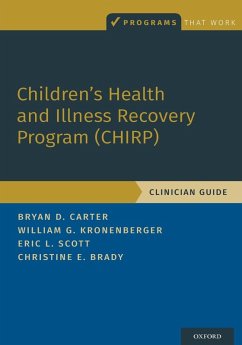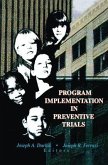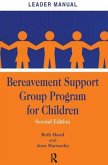Bryan D Carter, William G Kronenberger, Eric L Scott, Christine E Brady
Children's Health and Illness Recovery Program (Chirp)
Clinician Guide
Schade – dieser Artikel ist leider ausverkauft. Sobald wir wissen, ob und wann der Artikel wieder verfügbar ist, informieren wir Sie an dieser Stelle.
Bryan D Carter, William G Kronenberger, Eric L Scott, Christine E Brady
Children's Health and Illness Recovery Program (Chirp)
Clinician Guide
- Broschiertes Buch
- Merkliste
- Auf die Merkliste
- Bewerten Bewerten
- Teilen
- Produkt teilen
- Produkterinnerung
- Produkterinnerung
The Children's Health and Illness Recovery Program (CHIRP) - Clinician Guide is a structured treatment program, based on research and clinical experience, designed to help adolescents with chronic illness, and their families, improve the teen's functioning and quality of life.
Andere Kunden interessierten sich auch für
![Comprehensive Children's Mental Health Services in Schools and Communities Comprehensive Children's Mental Health Services in Schools and Communities]() Robyn S HessComprehensive Children's Mental Health Services in Schools and Communities53,99 €
Robyn S HessComprehensive Children's Mental Health Services in Schools and Communities53,99 €![Making Sense of Children's Drawings Making Sense of Children's Drawings]() John WillatsMaking Sense of Children's Drawings61,99 €
John WillatsMaking Sense of Children's Drawings61,99 €![Program Implementation in Preventive Trials Program Implementation in Preventive Trials]() Joseph A DurlakProgram Implementation in Preventive Trials70,99 €
Joseph A DurlakProgram Implementation in Preventive Trials70,99 €![Bereavement Support Group Program for Children Bereavement Support Group Program for Children]() Beth HaaslBereavement Support Group Program for Children36,99 €
Beth HaaslBereavement Support Group Program for Children36,99 €![Social Psychology of Health and Illness Social Psychology of Health and Illness]() Social Psychology of Health and Illness85,99 €
Social Psychology of Health and Illness85,99 €![GENTLE ON MY MIND - A slow, sensitive approach to recovery from mental illness GENTLE ON MY MIND - A slow, sensitive approach to recovery from mental illness]() Sandra ConiamGENTLE ON MY MIND - A slow, sensitive approach to recovery from mental illness13,99 €
Sandra ConiamGENTLE ON MY MIND - A slow, sensitive approach to recovery from mental illness13,99 €![Hypnotherapy Scripts to Promote Children's Wellbeing Hypnotherapy Scripts to Promote Children's Wellbeing]() Jacki PritchardHypnotherapy Scripts to Promote Children's Wellbeing168,99 €
Jacki PritchardHypnotherapy Scripts to Promote Children's Wellbeing168,99 €-
-
The Children's Health and Illness Recovery Program (CHIRP) - Clinician Guide is a structured treatment program, based on research and clinical experience, designed to help adolescents with chronic illness, and their families, improve the teen's functioning and quality of life.
Produktdetails
- Produktdetails
- Verlag: Oxford University Press
- Seitenzahl: 192
- Erscheinungstermin: 4. März 2020
- Englisch
- Abmessung: 251mm x 175mm x 13mm
- Gewicht: 363g
- ISBN-13: 9780190070267
- ISBN-10: 0190070269
- Artikelnr.: 58341239
- Herstellerkennzeichnung
- Libri GmbH
- Europaallee 1
- 36244 Bad Hersfeld
- gpsr@libri.de
- Verlag: Oxford University Press
- Seitenzahl: 192
- Erscheinungstermin: 4. März 2020
- Englisch
- Abmessung: 251mm x 175mm x 13mm
- Gewicht: 363g
- ISBN-13: 9780190070267
- ISBN-10: 0190070269
- Artikelnr.: 58341239
- Herstellerkennzeichnung
- Libri GmbH
- Europaallee 1
- 36244 Bad Hersfeld
- gpsr@libri.de
Dr. Bryan Carter is a Professor with the Department of Pediatrics, Division of Child & Adolescent Psychiatry and Psychology, University of Louisville School of Medicine, and the Service Chief of the Pediatric Consultation-Liaison Service to Norton Children's Hospital. He is the primary developer of the CHIRP (Children's Health & Illness Recovery Program) manualized treatment intervention for adolescents and their families coping with the challenges of chronic illness, and co-editor with Kris Kullgren, PhD, of the Clinician Handbook of Pediatric Psychological Consultation in Medical Settings. William G. Kronenberger, PhD, is Professor, Director of the Section of Psychology, and Executive Vice-Chair of the Department of Psychiatry at Indiana University School of Medicine (IUSM). He serves as Chief of the Pediatric Psychology Testing Clinic and Co-Chief of the ADHD Clinic at Riley Hospital for Children. He is an author of several tests, including the Learning, Executive, and Attention Author Biography Functioning scale (LEAF), Conduct-Hyperactivity-Attention-Oppositional Behavior Scale (CHAOS), the Pediatric Inpatient Behavior Scale (PIBS), and the Outburst Monitoring Scale (OMS). Eric L. Scott, PhD is a pediatric psychologist and Associate Professor of Pediatrics and Anesthesiology at the University of Michigan Medical School. He directs the MiPAIN (Michigan Pediatric and Adolescent Interdisciplinary Network) program, a comprehensive, interdisciplinary treatment program including physical therapy services, occupational therapy, psychotherapy, art and recreation therapy restoring health to individuals and their families with complex, chronic pain. Christine E. Brady, PhD is an Assistant Professor with the Department of Pediatrics, Division of Child & Adolescent Psychiatry and Psychology at the University of Louisville School of Medicine and the Assistant Chief of the Pediatric Consultation-Liaison Service to Norton Children's Hospital. Dr. Brady also has expertise in transgender
Acknowledgements
Introduction and Prep Session
Chapter 1: Session 1-Stress Identification and Management
Chapter 2: Session 2-Problem-Solving Skills
Chapter 3: Session 3-Relaxation Skills
Chapter 4: Session 4-Thought Challenging Skills
Chapter 5: Session 5-Time Management and Prioritization
Chapter 6: Session 6-Increasing Teen Independence
Chapter 7: Session 7-Assertiveness and Relationships
Chapter 8: SESSION 8: Family Roles, Communication, and Support
Chapter 9: SESSION 9: Keys to Maintaining Progress
Chapter 10: SESSIONS 10-12: Skill Reinforcement and Relapse Prevention
APPENDICES
Appendix A: Model 504 Letter
Appendix B: CHIRP Mastery Rating Scales
Appendix C: CHIRP Program Brochure
Appendix D: CHIRP Physician Referral Form
Appendix E: CHIRP Interdisciplinary Communication Form
Appendix F: CHIRP Feedback Form
Appendix G: Suggested Assessment Measures
Appendix H: Conducting CHIRP in a Group Format
Appendix I: CHIRP Group Intake Form
Appendix J: CHIRP Outcomes Study Results
Appendix K: CHIRP Follow-Up Study Results
Appendix L: CHIRP Commitment Form
References
Introduction and Prep Session
Chapter 1: Session 1-Stress Identification and Management
Chapter 2: Session 2-Problem-Solving Skills
Chapter 3: Session 3-Relaxation Skills
Chapter 4: Session 4-Thought Challenging Skills
Chapter 5: Session 5-Time Management and Prioritization
Chapter 6: Session 6-Increasing Teen Independence
Chapter 7: Session 7-Assertiveness and Relationships
Chapter 8: SESSION 8: Family Roles, Communication, and Support
Chapter 9: SESSION 9: Keys to Maintaining Progress
Chapter 10: SESSIONS 10-12: Skill Reinforcement and Relapse Prevention
APPENDICES
Appendix A: Model 504 Letter
Appendix B: CHIRP Mastery Rating Scales
Appendix C: CHIRP Program Brochure
Appendix D: CHIRP Physician Referral Form
Appendix E: CHIRP Interdisciplinary Communication Form
Appendix F: CHIRP Feedback Form
Appendix G: Suggested Assessment Measures
Appendix H: Conducting CHIRP in a Group Format
Appendix I: CHIRP Group Intake Form
Appendix J: CHIRP Outcomes Study Results
Appendix K: CHIRP Follow-Up Study Results
Appendix L: CHIRP Commitment Form
References
Acknowledgements
Introduction and Prep Session
Chapter 1: Session 1-Stress Identification and Management
Chapter 2: Session 2-Problem-Solving Skills
Chapter 3: Session 3-Relaxation Skills
Chapter 4: Session 4-Thought Challenging Skills
Chapter 5: Session 5-Time Management and Prioritization
Chapter 6: Session 6-Increasing Teen Independence
Chapter 7: Session 7-Assertiveness and Relationships
Chapter 8: SESSION 8: Family Roles, Communication, and Support
Chapter 9: SESSION 9: Keys to Maintaining Progress
Chapter 10: SESSIONS 10-12: Skill Reinforcement and Relapse Prevention
APPENDICES
Appendix A: Model 504 Letter
Appendix B: CHIRP Mastery Rating Scales
Appendix C: CHIRP Program Brochure
Appendix D: CHIRP Physician Referral Form
Appendix E: CHIRP Interdisciplinary Communication Form
Appendix F: CHIRP Feedback Form
Appendix G: Suggested Assessment Measures
Appendix H: Conducting CHIRP in a Group Format
Appendix I: CHIRP Group Intake Form
Appendix J: CHIRP Outcomes Study Results
Appendix K: CHIRP Follow-Up Study Results
Appendix L: CHIRP Commitment Form
References
Introduction and Prep Session
Chapter 1: Session 1-Stress Identification and Management
Chapter 2: Session 2-Problem-Solving Skills
Chapter 3: Session 3-Relaxation Skills
Chapter 4: Session 4-Thought Challenging Skills
Chapter 5: Session 5-Time Management and Prioritization
Chapter 6: Session 6-Increasing Teen Independence
Chapter 7: Session 7-Assertiveness and Relationships
Chapter 8: SESSION 8: Family Roles, Communication, and Support
Chapter 9: SESSION 9: Keys to Maintaining Progress
Chapter 10: SESSIONS 10-12: Skill Reinforcement and Relapse Prevention
APPENDICES
Appendix A: Model 504 Letter
Appendix B: CHIRP Mastery Rating Scales
Appendix C: CHIRP Program Brochure
Appendix D: CHIRP Physician Referral Form
Appendix E: CHIRP Interdisciplinary Communication Form
Appendix F: CHIRP Feedback Form
Appendix G: Suggested Assessment Measures
Appendix H: Conducting CHIRP in a Group Format
Appendix I: CHIRP Group Intake Form
Appendix J: CHIRP Outcomes Study Results
Appendix K: CHIRP Follow-Up Study Results
Appendix L: CHIRP Commitment Form
References









